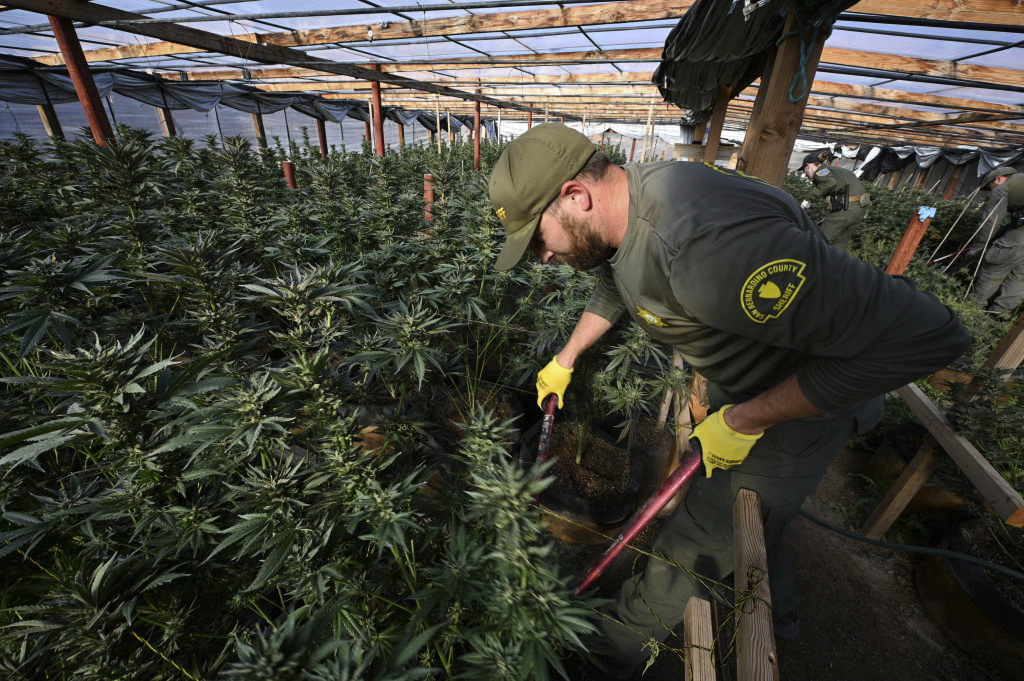________
California Legalized Drugs. Cartels Took It Over.
by Daniel Greenfield | June 21, 2024
Six years after California legalized marijuana, the bodies keep piling up. Drug legalization has failed on every level. The legal drug business is collapsing. Cartels and gang members dominate the business. And open borders allowed them to bring massive numbers of laborers to boost their ranks.
Pictured: San Bernardino County Sheriff's deputies and other law enforcement agents cut down
cannabis plants during a raid on an illegal cannabis farm in Newberry Springs, in the western
Six years after California legalized marijuana, the bodies keep piling up. Earlier this year, six men were murdered in the Mojave Desert. Four of the men had been burned after being shot with rifles. In 2020, seven people were killed at an illegal pot operation in Riverside County.
Violence like this was supposed to disappear after legalization. Legalization advocates argued that making the drug trade legal would end the grip of the cartels. Instead, the legal market has failed, and the cartels are taking over sizable parts of California and the rest of the country.
California's legal drug revenues have fallen consistently, as have those in other legal drug states including Colorado, whose model helped sell the idea that drug money would fix everything.
Despite falling revenues, Colorado legislators brag about $282 million in drug revenue. That number may sound high, but it's a drop in the bucket considering the money that the state and cities like Denver are spending on homelessness, drug overdoses and law enforcement.
While the legal drug business is also collapsing in California, the state is spending a fortune fighting marijuana even as it tries to tax it. Gov. Gavin Newsom paradoxically promised to close the budget deficit with $100 million in drug revenue, meant to be used to fund law enforcement and fight substance abuse. The state seized over $300 million in illegal pot this year and uses satellite imagery and heavily-armed raids to fight untaxed marijuana.
But despite all those efforts, illegal marijuana has won and legal marijuana has lost.
The Los Angeles Times warned two years ago:
Violence like this was supposed to disappear after legalization. Legalization advocates argued that making the drug trade legal would end the grip of the cartels. Instead, the legal market has failed, and the cartels are taking over sizable parts of California and the rest of the country.
California's legal drug revenues have fallen consistently, as have those in other legal drug states including Colorado, whose model helped sell the idea that drug money would fix everything.
Despite falling revenues, Colorado legislators brag about $282 million in drug revenue. That number may sound high, but it's a drop in the bucket considering the money that the state and cities like Denver are spending on homelessness, drug overdoses and law enforcement.
While the legal drug business is also collapsing in California, the state is spending a fortune fighting marijuana even as it tries to tax it. Gov. Gavin Newsom paradoxically promised to close the budget deficit with $100 million in drug revenue, meant to be used to fund law enforcement and fight substance abuse. The state seized over $300 million in illegal pot this year and uses satellite imagery and heavily-armed raids to fight untaxed marijuana.
But despite all those efforts, illegal marijuana has won and legal marijuana has lost.
The Los Angeles Times warned two years ago:
"Proposition 64, California's 2016 landmark cannabis initiative, sold voters on the promise a legal market would cripple the drug's outlaw trade, with its associated violence and environmental wreckage.Some of the growers are private citizens, but they aren't likely to remain in business for long.
"Instead, a Los Angeles Times investigation finds, the law triggered a surge in illegal cannabis on a scale California has never before witnessed.
"Rogue cultivation centers like Mount Shasta Vista now engulf rural communities scattered across the state, as far afield as the Mojave Desert, the steep mountains on the North Coast, and the high desert and timberlands of the Sierra Nevada.
"Residents in these places describe living in fear next to heavily armed camps..."
Cartels and gang members dominate the business. And open borders allowed them to bring massive numbers of laborers to boost their ranks. Not only California, but places as far afield as Maine that have large open areas and limited law enforcement resources, have been overrun by drug operations that more closely resemble parts of Latin America and Asia than the USA.
Please go to Gatestone Institute to continue reading.
________
Essential reading for state legislatures like in Florida:
More evidence of civilizational collapse:
Remember this clown? Boehner later went on to do info commercials for a medical cannabis company.

No comments:
Post a Comment
Note: Only a member of this blog may post a comment.